 Cornell’s Muslim community is American and foreign-born, Shia and Sunni, traditional and modern.
Cornell’s Muslim community is American and foreign-born, Shia and Sunni, traditional and modern.
Since 9/11, and with the Iraq War still raging, Muslim Cornellians are facing new challenges— and trying to balance tradition with life on a liberal American campus.
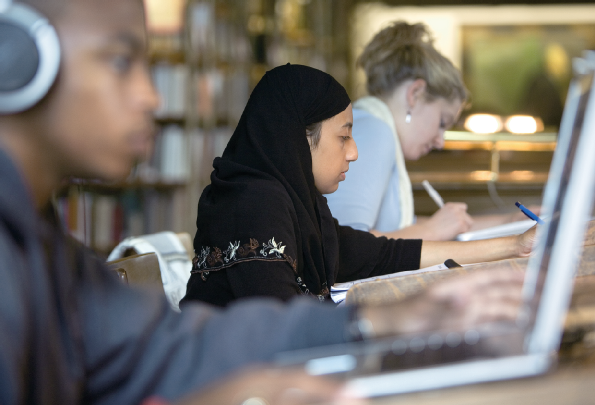
Cornell's Muslim community is American and foreign-born, Shia and Sunni, traditional and modern.
Since 9/11, and with the Iraq War still raging, Muslim Cornellians are facing new challenges— and trying to balance tradition with life on a liberal American campus.
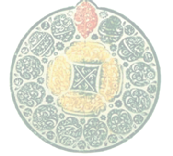 It's the Saturday of Labor Day weekend, and cotton clouds dot a bright blue sky as North Campus buzzes with activity. On the lawn in front of Helen Newman Hall, a pickup soccer match pits shirts against skins. Just out of harm's way, two string-bikini-clad under-grads work on their tans. Behind Appel Commons, a second soccer game pauses as the players stop to shout friendly obscenities by way of greeting to a late arrival.
It's the Saturday of Labor Day weekend, and cotton clouds dot a bright blue sky as North Campus buzzes with activity. On the lawn in front of Helen Newman Hall, a pickup soccer match pits shirts against skins. Just out of harm's way, two string-bikini-clad under-grads work on their tans. Behind Appel Commons, a second soccer game pauses as the players stop to shout friendly obscenities by way of greeting to a late arrival.
Closer to the building, a dozen students lounge on the grass around Race to the Kabah, a children's board game. Today is the back-to-school picnic of the Muslim Educational and Cultural Association (MECA), though by now only a few empty Domino's pizza boxes and half-full bottles of soda remain. A half-dozen women and girls, several wearing the traditional headscarf known as hijab, kick a soccer ball around in a circle; near the tennis courts, a group of men play Frisbee.
Without instructions for the board game—a sort of hybrid of Trivial Pursuit and Candyland where players roll dice to progress toward a center square marked Kabah, the holy site toward which Muslims face as they pray—the players make up their own rules. After each toss of the dice, a player picks a card asking for the translation from Arabic of one of the myriad names of Allah. "I don't know that you have to pronounce it correctly," argues New York City native Zubair Al Azad '09, MECA's outreach coordinator and the picnic's organizer, as the native speakers object to a question so garbled they have to ask for the spelling of the Arabic word on the card. A grad student called Muktadur crows as he draws the question, "What is the meaning of Al-Muktadur?" He responds, confident in the translation of his own name: "The powerful." Few of the non-Arabic players perform as well, and they take the resultant ribbing good naturedly. "You're not a good Muslim," the native speakers tease, to plenty of laughter. Meanwhile, red spaces ("Danger! Shatan is hiding here, go back") and purple shortcuts ("Allah guides you to a special path") level the playing field.
Worldwide, more than one billion people practice the Islamic faith. Estimates of the American Muslim population range between 5 and 9 million, comprising immigrants, converts, and the American-born children of both groups. As that wave of hyphenated citizens comes of age, college students nationwide are grappling with what it means to be Muslim and American in a time when their homeland wages war in the Middle East and headlines scream of violence perpetrated in the name of their faith.
MECA has taken care to steer clear of events that might intensify schisms and strife. 'They hardly take any position on the national issues of various Muslim nations—the Palestinian-Jewish conflict is never mentioned, or the conflict between India and Pakistan, or the conflict between secular and non-secular Turkish groups,' says Omar Afzal, PhD '86.
At Cornell, whose nonsectarian founding tended emphatically toward Christian traditions, Muslim students have been a visible part of the interfaith mix since at least the late Sixties, when MECA got its start as a graduate student spinoff of the Arab Club. In the wake of 9/11, as students grappled with the political realities of America's relationship to the Muslim world, the organization reconstituted itself as an undergraduate club with an emphasis on outreach and education to Muslims and non-Muslims alike.
Cornell's Muslims hail from around the world, with roots in India, Pakistan, Bangladesh, Turkey, Ethiopia, Yemen, Indonesia, and Malaysia, as well as throughout the U.S. Each culture has its own traditions, yet all pray Jumu'ah together, including Shias and Sunnis. "There are four schools of Islamic jurisprudence, and they are a really big thing back home, but not here," says New Delhi native Omar Afzal, PhD '86, who notes that MECA has taken care to steer clear of events that might intensify schisms and strife. "They hardly take any position on the national issues of various Muslim nations—the Palestinian-Jewish conflict is never mentioned, or the conflict between India and Pakistan, or the conflict between secular and non-secular Turkish groups."
This fall—in a trend mirrored at Brown, Georgetown, NYU, Princeton, and Yale—the interfaith Cornell United Religious Work (CURW) welcomed Omer Bajwa, MS '03, MA '06, its first official Muslim chaplain. "A huge element is offering spiritual counsel, advice, and coaching through difficult situations," says Bajwa, a thirty-year-old student in the Hartford Seminary's Islamic chaplaincy training program whose part-time, interim appointment will lay the groundwork for fundraising and recruitment of a full-time chaplain. "I grew up here, went to school here; I understand the issues students face. Chaplains aren't religious authorities or experts, per se. We're there to help people work through these issues."
As with the Race to the Kabah, the rules for Muslim Cornellians balancing religious observation with life on a secular American college campus are largely unwritten—and as the faith itself emphasizes personal interpretation of the Qur'an over central authority, practice varies widely. As entering freshmen, Pakistani Americans Nabeela Abid '09 and her sister Afsha '04 penned letters to Campus Life administrators requesting single rooms in all-female dorms to accommodate their faith. Afsha wore hijab and ate only vegetarian offerings in the dining halls to comply with halal restrictions; Nabeela, who considers herself a "moderate Muslim," does neither. "Although I don't wear a scarf, I pray five times a day, and when I fast I wake up at four or five in the morning," says the applied economics and management major. "That might disturb a roommate—or she might bring boyfriends over." The youngest of three sisters, the Staten Island native says her parents have always been flexible about her observance level, so she hasn't felt compelled to rebel as some of her high school friends did. At the same time, she admits with a laugh, her mom sends regular text messages exhorting her daughter to remember Allah, complete with the day's prayer times.
Biology major Sabrina Imam '09, a native of Corpus Christi, Texas, and the daughter of Bangladeshi immigrants, attended a Catholic high school. While her family has always identified itself as Muslim, she became more observant in ninth grade, in the wake of 9/11. "I had the opportunity to decide what I wanted to do, how I wanted to express myself religiously," says the nineteen-year-old, who became president of MECA in April. "Because there were very few Muslims in my class, a lot of people turned to me, not necessarily in an active way, but just in conversation: 'So what is Islam all about?' " Imam wasn't entirely sure, so she began reading online and talking with relatives and members of her family's mosque. At Cornell, she joined the MECA e-mail list, made a point of meeting her Muslim peers, and enrolled in courses on Islamic civilization and the Qur'an. "I wanted a more formal knowledge of Islam," says Imam, who's considering pursuing an MD-PhD after graduation.
For junior Abdul Chaballout, a transfer from UCLA and the native Arabic speaker for the West Campus Language House, being Muslim has fit comfortably with his academic and social pursuits. "I have the ability to pray when I want to, and professors and TAs who understand that," he says. "I don't have to engage in anything that I believe is wrong, whether it's dining halls providing alternatives to pork, or friends understanding that no means no to a drink." Even so, his classes have occasionally conflicted with Jumu'ah, the Friday midday congregational prayer required of all Muslim men. This fall, he has been skipping his Friday afternoon nutrition class, instead listening to recorded lectures and reviewing the PowerPoint slides the professor posts online. But last year Chaballout had a class he couldn't skip and missed services for a whole semester. "It's really a loss not being able to participate in Jumu'ah, but I don't believe in boycotting a course," he says. "We believe that God is forgiving, so if we can't pray at that one moment because of extenuating circumstances, such as a class that you need to take to graduate, then God will forgive you if you postpone your prayer a little bit."
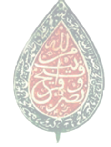 By the time Omar Afzal arrived on campus in August 1973, the nascent MECA had dissolved in the wake of the Pakistan-Bangladesh conflict. Without a local mosque or an active Muslim community in Ithaca, he had a hard time finding enough men to constitute a congregation of five, the minimum required to hold Jumu'ah, so he prayed alone. Then one day in Egan's grocery store in College-town, while reading labels to find foods consistent with halal regulations, he heard the Muslim greeting Salaam Alaikum; the voice belonged to a Turkish grad student in engineering. "He knew a lot of Turks and used to pray five times a day, like me," says Afzal, now retired from his job as a Southeast Asia assistant in the Cornell libraries and still living in Ithaca. "We decided we would pray together as much as we can."
By the time Omar Afzal arrived on campus in August 1973, the nascent MECA had dissolved in the wake of the Pakistan-Bangladesh conflict. Without a local mosque or an active Muslim community in Ithaca, he had a hard time finding enough men to constitute a congregation of five, the minimum required to hold Jumu'ah, so he prayed alone. Then one day in Egan's grocery store in College-town, while reading labels to find foods consistent with halal regulations, he heard the Muslim greeting Salaam Alaikum; the voice belonged to a Turkish grad student in engineering. "He knew a lot of Turks and used to pray five times a day, like me," says Afzal, now retired from his job as a Southeast Asia assistant in the Cornell libraries and still living in Ithaca. "We decided we would pray together as much as we can."
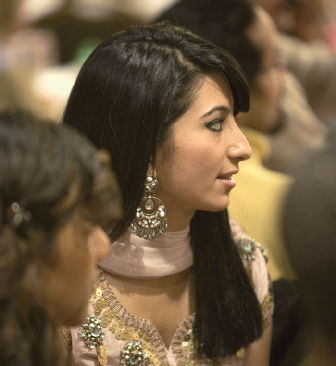
At first, the pair alternated between Afzal's Collegetown apartment and a storage room provided by the Turkish student's adviser, eventually connecting with Pakistani and Bangladeshi men. By the mid-Seventies, the group was large enough to approach the Reverend Jack Lewis, then director of CURW, to request use of a space in Anabel Taylor Hall free of religious iconography. Afzal bought a freezer and often slaughtered animals himself to provide halal meat for Muslims on and off campus. To celebrate the end of the fasting month of Ramadan, the group hosted an annual Eid banquet. "We didn't have any kind of formal membership," recalls Afzal. "Whenever we needed money, we announced it and people donated whatever they could."
Today, MECA's e-mail list has about 400 members and a faculty adviser; when classes are in session, Jumu'ah attendance approaches 300. Last year's Eid banquet filled the Willard Straight Hall Memorial Room with men, women, and children from around the world, including Muslim faculty, staff, and students, as well as dozens of non-Muslim guests. Other events include the back-to-school picnic, an interfaith fast-a-thon charity fundraiser associated with the month of Ramadan, visiting speakers, and volunteer events with Cornell's Hillel and other faith groups on campus. Every spring, Near Eastern studies co-sponsors MECA's Islam Awareness Week, a series of lectures, film screenings, and panel discussions on such topics as Islamic law, culture, and art, the status of women, and human rights.
'The Qur'an,' argues Barazangi, 'is the root of democratic feminism in its broadest sense, a creative view of egalitarian active participation in the community's decision-making process.'
Chicago native Aneesa Mitchell '06, who during her senior year served as MECA's first female president, says wearing the hijab made her a go-to person on campus for questions about the faith and the war in the Middle East. And while people often assumed that she was a foreign student—greeting her in Arabic and once even in Hindi—she rarely felt unsafe, as she did in Chicago in the hours after 9/11. "When the planes hit I was on the highway," says the African American paralegal. "People were pulling over and crying, and other people were pulling alongside my car, honking and pointing at me. I was an obvious target—here's one of those people who did this to us."
In August, David Horowitz, author of Indoctrination U.: The Left's War Against Academic Freedom, announced plans for a national conservative protest known as Islamofascism Awareness Week, to confront the two "big lies of the political left": that George Bush created the war on terror and that global warming is a greater threat than terrorism. The Friday after Horowitz's announcement, following Jumu'ah, a member of the Cornell congregation called upon his fellow Muslims to begin formulating a response. "This is a test, to see how we're going to respond to this kind of garbage," he said. "This should not go unanswered." Imam, the MECA president, feels conflicted on that point. She and former president Shaan Rizvi '07 have often contacted the Daily Sun when they believe it has printed misinformation on Islam. When it comes to fringe groups, though, it's a tough call. "We generally don't respond to purposefully derogatory statements, because we feel that if people are just trying to make you upset, there's no point in indulging them." Even so, she says, "it's important to make sure, on the record, that we continue to have an atmosphere on campus where everyone is respected."
 As Jumu'ah begins, it's cool and quiet in Anabel Taylor's One World Room. Fabric rustles as supplicants stand and kneel to offer two raka'at (repetitions of prayer), and a child whispers. Behind the folding screen that shields the women's red, white, and blue prayer rug from the men's section at the front, a few women have positioned themselves to see the speaker through the gaps left by the hinges. One grad student tugs a voluminous lavender skirt and matching waist-length headscarf from her backpack and pulls the ensemble over the slacks, long-sleeved shirt, and black hijab she's worn the rest of the day on campus. The men wear long pants and only a few sport short sleeves.
As Jumu'ah begins, it's cool and quiet in Anabel Taylor's One World Room. Fabric rustles as supplicants stand and kneel to offer two raka'at (repetitions of prayer), and a child whispers. Behind the folding screen that shields the women's red, white, and blue prayer rug from the men's section at the front, a few women have positioned themselves to see the speaker through the gaps left by the hinges. One grad student tugs a voluminous lavender skirt and matching waist-length headscarf from her backpack and pulls the ensemble over the slacks, long-sleeved shirt, and black hijab she's worn the rest of the day on campus. The men wear long pants and only a few sport short sleeves.
The last strains of a chimes concert float through the open window at the back of the room, along with the barest breeze; an Egyptian postdoc at Cornell's Institute for Genomic Diversity stands to deliver the khutba—a sermon toggling between English and the recitation of verses from the Qur'an in Arabic—on practicing Islam at Cornell. "You are Muslim, and the knowledge you have comes from Allah," he admonishes the congregation. "Here within your Muslim brothers you should be humbler. We have different backgrounds, yet we mix without background, without prejudice. What unites us is Islam."
Imam, whose mosque in Corpus Christi welcomed a similarly diverse congregation, sees the sharpest distinction as one of practice, not heritage. "Whereas there isn't a lot of tension based on nationality, I think there is a lot of tension based on level of observance," she says. "It's not vocal, but it is palpable." When she decided to run for MECA president last year, she worried about how she'd be perceived. "I had that apprehension of 'Will I be taken seriously because I don't wear hijab or because I'm a girl?' "
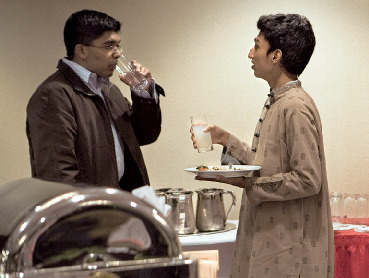
Nimat Hafez Barazangi, PhD '88, author of Woman's Identity and the Qur'an and a research fellow in feminist, gender, and sexuality studies, has spent much of the last two decades delving into the gender dynamics of Muslim practice and the foundations of such traditions in the Qur'an. "The Qur'an," she argues, "is the root of democratic feminism in its broadest sense, a creative view of egalitarian active participation in the community's decision-making process." The subjugation of women throughout much of the Muslim world is due not to a thorough reading of the Qur'an or the writing of the Prophet Muhammad, she says, but patriarchal interpretations handed down over centuries.
In the early Nineties, conservative graduate students from Yemen, Algeria, and Saudi Arabia and their wives lobbied for the screen at the back of the One World Room that separates the men's and women's spaces during Jumu'ah. Barazangi, then MECA's adviser and a CURW board member, had grave reservations about the shifting role of women in the community symbolized by the installation of the screen. She no longer attends services; she and her husband, professor of geological sciences Muawia Barazangi, pray at home or in their offices on campus. Today the screen remains a fixture, and while the prayer rug itself extends beyond the width of the screen, women rarely step from behind it. "Part of the problem the students face is ignorance not only on the part of the non-Muslims but sometimes of themselves as Muslims," says Barazangi, a native of Syria who was invited by the United Nations to consult on the status of women in Iraq's draft constitution. "They don't understand Islam in totality; they often practice it just as a religious ritual, and these rituals are set in stone as they were practiced by their ethnic community or whatever nationality they come from. They don't attempt to understand each other's perspective or where they come from."
Near Eastern studies professor Shawkat Toorawa, who served as adviser to MECA from 2002 to 2006 and now lives with his wife and two daughters in Mews Hall as a faculty family in residence, sees the fault line separating Muslims on campus as a question of where an individual came of age. Most of Cornell's Muslim graduate students and faculty grew up in nations where Islam is the dominant faith, while most undergraduates are American-born. "Their experience is quite different and they often can't talk to each other," says the scholar of Arabic literature, noting that the temptation to export the old-world experience to Anabel Taylor can be powerful. "The reality is that we're here, so the experience of most people has to be that of being in the minority."
Muslim undergraduates say that, for the most part, they've found Cornell welcoming and accommodating. It's the world off campus that can make integrating their Muslim and American sides more challenging. This summer, on his way home from visiting extended family in Syria with his mother, sister, and brother, Chaballout waited several hours as a U.S. customs agent at JFK read each of the 300 text messages on his cell phone. "Is it because my name is Abdul?" he wonders, noting his American citizenship. Such occasions make it harder to balance his identification as both Muslim and American. "Are we as Americans going to alienate the American Muslim population or accommodate them?" he asks. "That's the overarching question."
SHARON TREGASKIS '95 is a CAM contributing editor.


